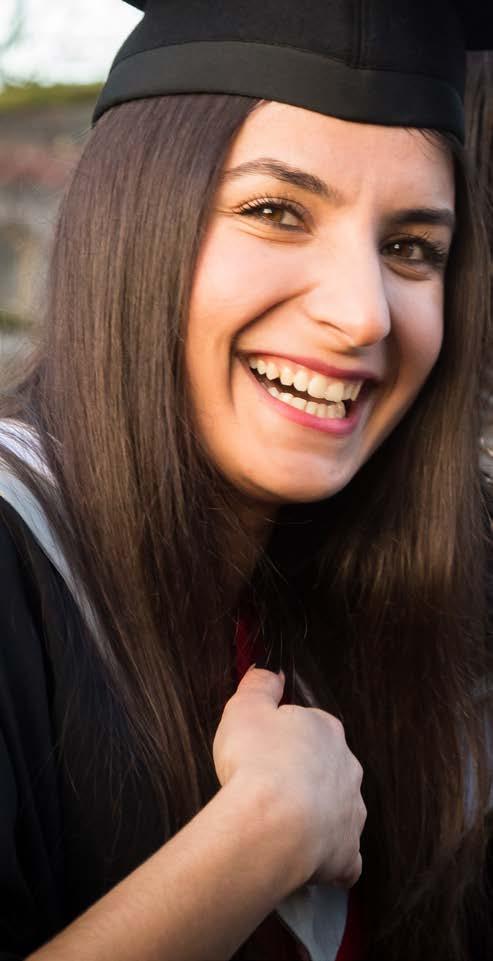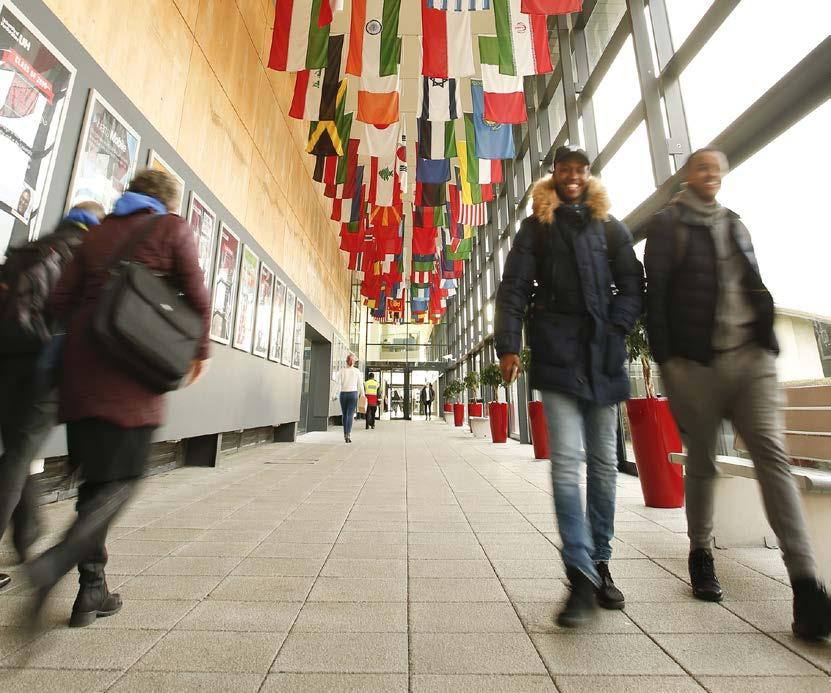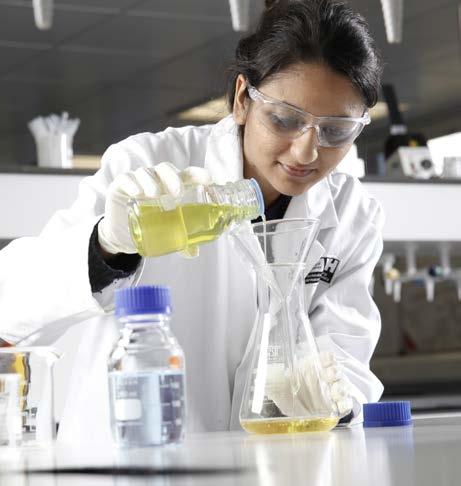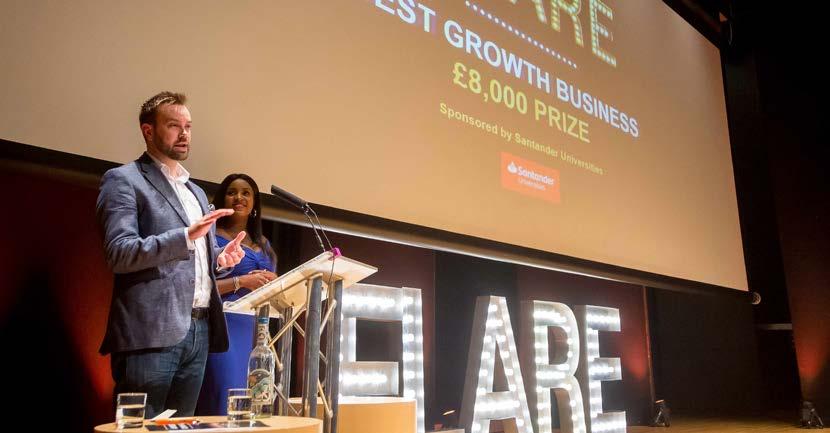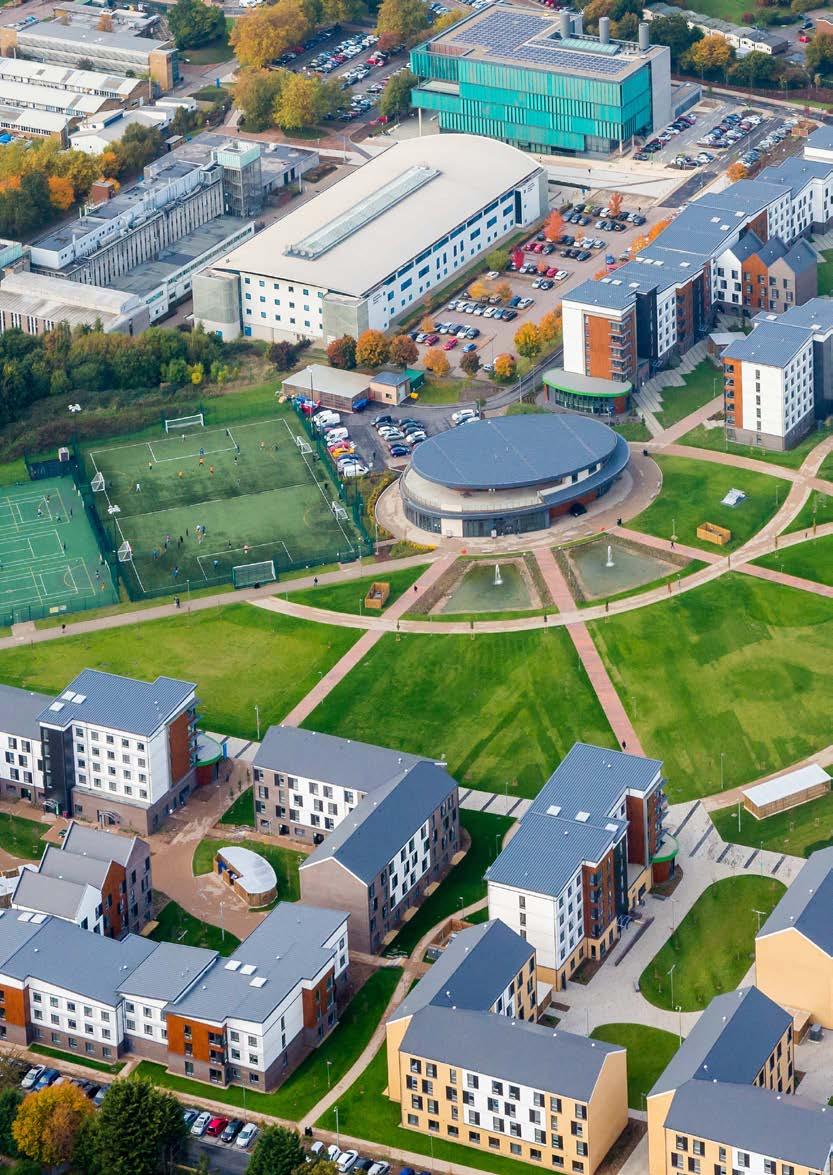POWERING POTENTIAL
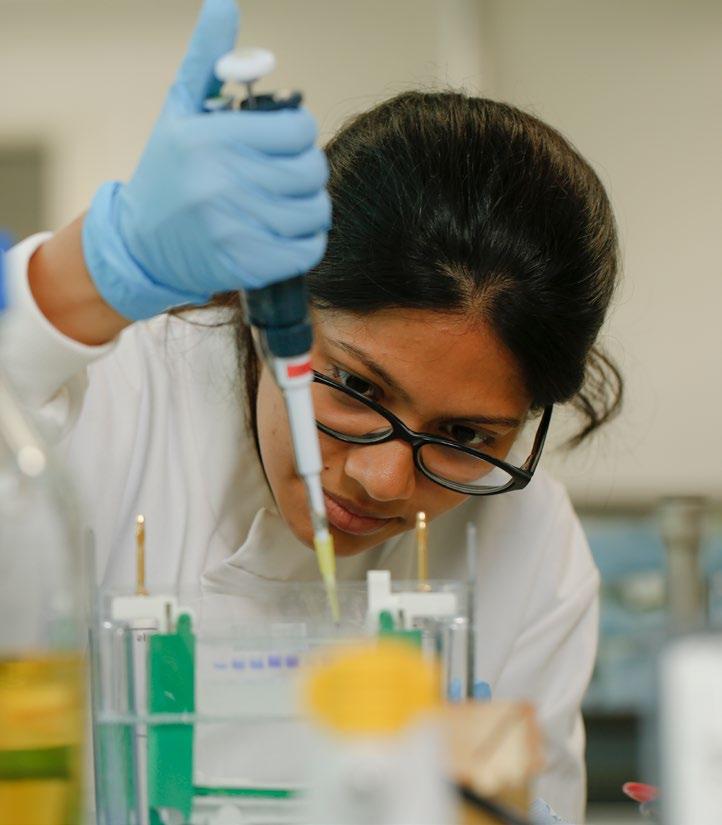
Our vision is to transform lives, and power the potential of not just our students and staff, but our wider community. Our students graduate with excellent skills aligned with the needs of employers and industry, enhancing their career prospects. We co-design, implement and grow business ideas and ventures, making our expertise accessible to market and powering businesses across the region.
Professor Quintin McKellar CBE Vice-Chancellor
Ranked among the top 10% of Universities for local growth and regeneration Research England
Ranked 16th in England for social mobility impact
Institute for Fiscal Studies 2021
We jumped 12 places in the 2023 Complete University Guide league table, and climbed 16 places to 74th in the 2023 Guardian University Guide
Welcome to the University 4 Our history 6 Executive team 8 Our vision and strategic plan 10 Education and student experience 12 Research 13 Enterprise 14 Global engagement 15 School of Life and Medical Sciences 16 3 One of 17 universities awarded the Race Equality Charter Mark Ranked in the top ten in all areas of the survey Postgraduate Taught Experience Survey 2022 One of only 20 universities awarded University Enterprise Zone status 90% of our research has been judged as ‘internationally excellent’ or ‘world leading’ Research Excellence Framework 2021
Contents
Welcome to the University of Hertfordshire
Set across two campuses and our Bayfordbury Observatory, we’re just 20 miles from London.
As an innovative, enterprising university, focused on transforming lives, we care about our staff and students and provide them with the opportunity to succeed no matter what their background.

4 Powering Potential
With our heritage in Britain’s pioneering aeronautical industry, we have been an innovative force in education since the early 1950s, and our focus on students’ employability and transferable skills can be traced back to our aeronautical origins.
We drive economic growth through cutting-edge research, creative and innovative thinking, skills development, bespoke training, and facilities that help businesses achieve their potential. All of our activities are underpinned by our core values; we are friendly, ambitious, collegiate, enterprising, and student-focused in everything we do.
We have just under 32,000 students studying over 550 undergraduate, postgraduate and research degrees in the UK. We also have more than 6,500 students taking courses outside the UK through international partnerships and franchise arrangements.
Our teaching is delivered across seven academic schools: Creative Arts, Health and Social Work, Hertfordshire Business School, Hertfordshire Law School, Life and Medical Sciences, Physics, Engineering and Computer Science, and Social Sciences, Humanities and Education.
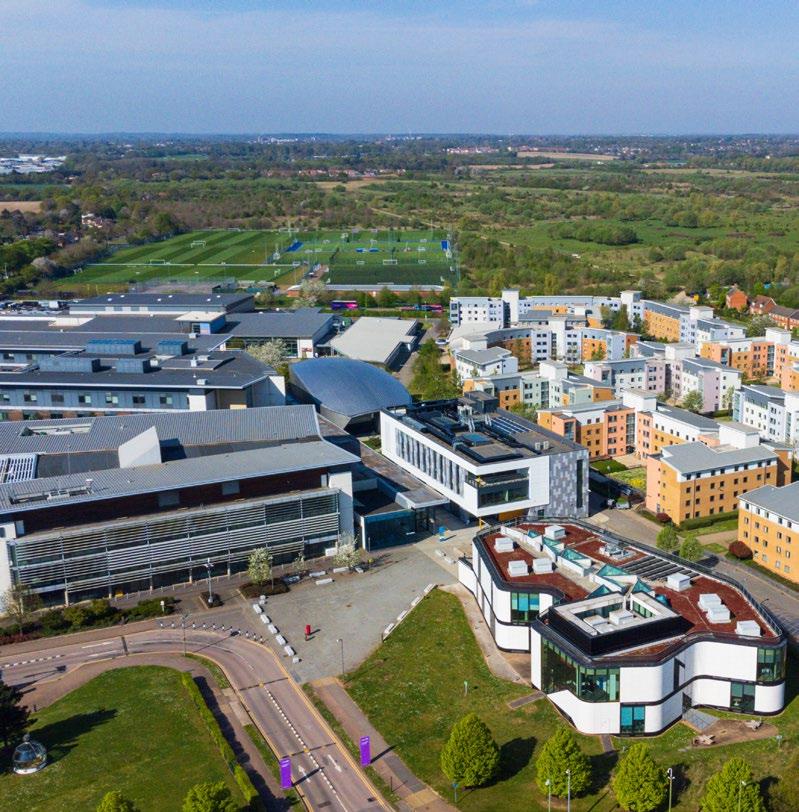
5
de Havilland Campus
Our history 19521959
Hatfield Technical College
1952 saw the opening of a new Technical College in Hatfield, with HRH Prince Phillip, Duke of Edinburgh performing the opening ceremony. With its roots in Britain’s pioneering aeronautical industry, the College soon established itself as an innovative force in education, awarding our first BSc (Engineering) qualifications to external students of the University of London in 1959.
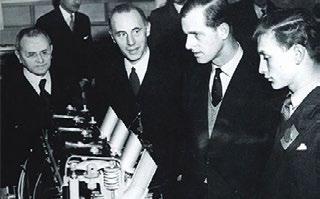
19601968
Hatfield College of Technology
In 1960, the institution was renamed Hatfield College of Technology and began to invest in computer science, buying the College’s first digital computer in 1963 – a National Elliott 803B digital computer, at a cost of £24,010. In 1965, the college became recognised for 13 Honours Degree courses, including Computer Science and Civil Engineering, with BA (Hons) Business Studies coming a year later.
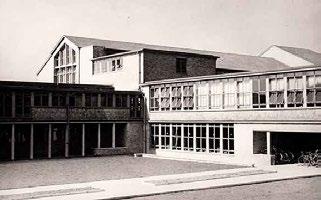
6 Powering Potential
19691991
In 1969, the College was designated as Hatfield Polytechnic, and by 1970 had formed the best equipped and staffed Computer Centre in education. In 1975, the Polytechnic was reorganised into five schools of study and a centre for Management Studies.
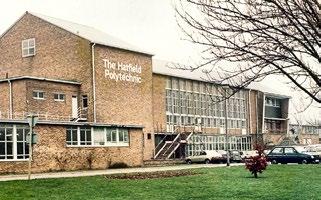
1992 - Present
Hatfield Polytechnic University of Hertfordshire
Hatfield Polytechnic became The University of Hertfordshire on 29 June 1992. In 2003 the de Havilland Campus, a £120 million project, was opened by HRH Prince Philip, the Duke of Edinburgh. In 2016, he visited the campus to open the £50 million Science Building. Our Enterprise Hub was opened in 2021. Today, we have a student community of just under 32,000 on UK based programmes across our campuses.
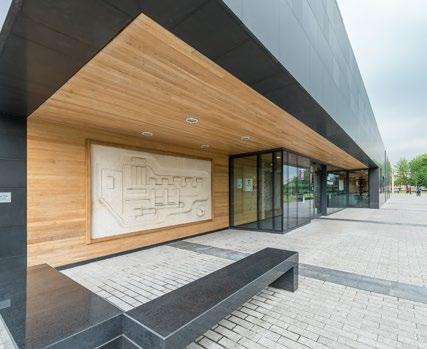
7
Executive team
As Chief Executive, the Vice-Chancellor exercises considerable influence upon the development of University strategy, the identification and planning of new development and the shaping of the University ethos. The executive team – the Deputy Vice-Chancellor, Secretary and Registrar, Executive Director for Business, International, Marketing and Recruitment, Pro Vice-Chancellor Education and Student Experience, Pro Vice-Chancellor Research and Enterprise, and the Group Finance Director all contribute to this aspect of work.
Professor Quintin McKellar CBE Vice-Chancellor and Chief Executive

Quintin has been the Vice-Chancellor and Chief Executive of the University since 2011. His responsibilities include the day-to-day running of the institution, the delivery of strategic and operational plans, performance, its internal structure and organisation, and its interface with external bodies and agencies. In 2015 he was elected as a Board member of Universities UK (UUK), and in 2020 was elected as UUK Vice-President (England and Northern Ireland). In 2021 he was elected as a Board member of Advance HE. He was made Commander of the Order of the British Empire (CBE) in 2011 for services to science.
Professor Julie Newlan MBE Deputy Vice-Chancellor

Julie was appointed Deputy Vice-Chancellor in February 2022. She was previously Pro Vice-Chancellor for Business and International Development. She is engaged in all strategic and operational decisions which underpin the positioning and success of the University, and will be leading the University’s strategic plan.
Julie has overall responsibility for University planning, including the development of all academic areas through the respective deans, staff development, international and regional partnerships and developments, recruitment, induction and retention of students, student experience and student outcomes.
Sharon Harrison-Barker Secretary and Registrar

Sharon was appointed in January 2020. She was previously the Academic Registrar, Head of the Student Centre and Faculty Registrar for the Business School and has worked in various further and higher education institutions. She achieved an MBA in Higher Education Management from the University of London in 2010.
Sharon is responsible for the management and operation of the Board of Governors and the Academic Board, compliance with University policies, regulations and procedures, legal matters of the University and its wholly owned subsidiaries, health and safety, internal audit, equality, registry, human resources, library and computing services, the office of the dean of students and professional staffing.
8 Powering Potential
Jo Stuart Executive Director for Business, International, Marketing and Recruitment
Jo was appointed in March 2022, and oversees the work of Marketing Communications, Business Development, and the International Office.
She joined the University in 2018 as the Director of Marketing and Communications and over the last four years, Jo has worked tirelessly to transform the University’s marketing and communications function by embedding insight and data-led decision-making across all marketing and communications activities.

Jo previously worked in the Financial Services sector, bringing with her 20 years’ experience in senior leadership roles across product development, marketing, communications and sales.

Dr Mairi Watson Pro Vice-Chancellor (Education and Student Experience)
Mairi joined the University in May 2020 as Pro Vice-Chancellor Education and Student Experience. She leads strategy and performance, as well as policy development and delivery, in learning and teaching, student experience, quality assurance and student union relationships. Mairi is a Chartered Fellow of the Chartered Management Institute and regularly contributes to external events on the leadership of educational change in challenging contexts.
Professor John Senior Pro Vice-Chancellor (Research and Enterprise)


Appointed in 2006, John is responsible for leading University research and the delivery of research degrees, chairing the University Research Committee, developing international research partnerships in Australia, China, Malaysia, and Vietnam, and overseeing the Doctoral College, which is a community of more than 700 research degree students.
From 2003 to 2006 John was the University Director of Enterprise and Knowledge Transfer as well as being a Dean of Faculty.
He has an international research profile in the field of optical fibre communications and networking, is on the Executive Committee of the Engineering Professors Council and chairs the Research and Enterprise Network for Universities (RENU).
Alistair Moffat Group Finance Director
After a career in senior positions in the transport industry, Alistair was appointed Group Finance Director in 2009. He has responsibility for all aspects of financial management within the University Group, including financial control, statutory reporting, treasury, tax, insurance, procurement and commercial financial support for the academic community.
His role incorporates Board responsibility for the management of the University's estate and sport. He is a director of UH Holdings Limited, which oversees the commercial subsidiaries in the Group, and is a director of our subsidiary companies.
Alistair was joint chair of the London and South-East British Universities Finance Directors’ Group (BUFDG) from 2016-2021.
9

10 Powering Potential
Our vision and strategic plan
Our vision to transform lives reflects the ambition and inspiration that is central to the University. It is built on the belief that whatever your background, wherever you are from, higher education can be a transformational experience. And whoever you are, the application of university research can impact your life.
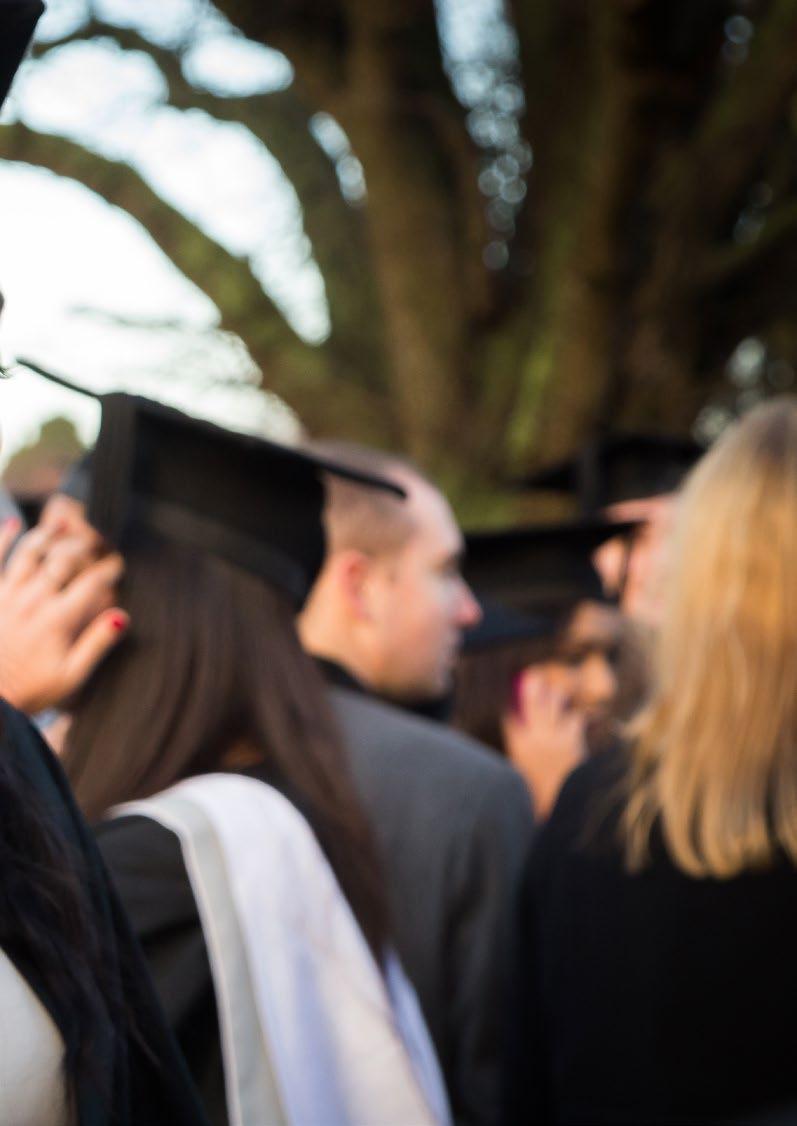
We are committed to having a positive transformational impact on every member of our University community.
Students and staff contributed to the development of our strategic plan which informed our focus on transforming lives. It reflects the values of ambition and inspiration that are central to the University. Our three key themes of opportunity, community and flexibility also grew out of this engagement and reflect both what is important to the University, but also how we will approach challenges in the coming years.
The 2020-2025 strategy builds on our strengths and embeds our focus on employability, enterprise, and business partnerships. It looks at future challenges – modern technologies, the changing world of work, and increasing interconnectivity across the globe – all areas our students presented to us in 2018 as future challenges.
Scan or click below to find out more about our strategic plan go.herts.ac.uk/strategic-plan

11
Education and student experience
We deliver high-quality and distinctive education that transforms lives by providing opportunities to develop students’ skills for life, working in partnership with our student community, and delivering flexible education with clear career pathways.
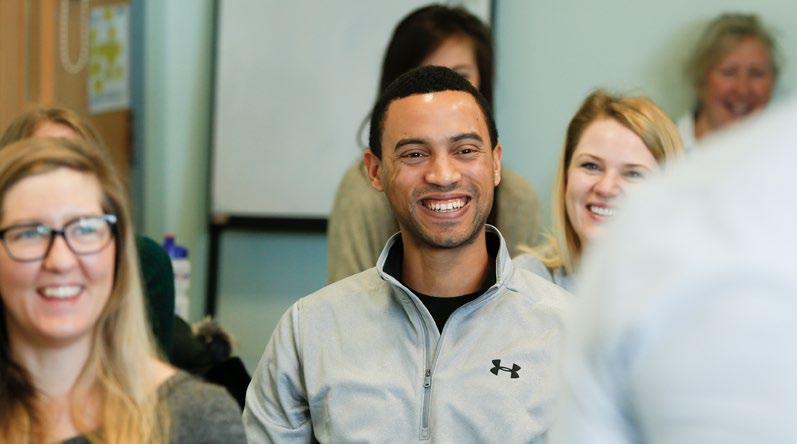
We do this through the expertise of our academic staff who design and deliver our courses. More than 70% of our staff hold professional recognition through Fellowships of the Higher Education Academy in teaching and learning compared to 54% across the sector.
We are proud of our 14 Principal Fellows and 80 Senior Fellows of the HEA, and our 10 National Teaching Fellows and 22 Professors and Associate Professors in Teaching and Learning.
Our Widening Access work targets primary- and secondary-aged learners, while our Student Success work supports learners currently studying at the University. Students are selected based upon where the data indicates gaps in equality of opportunity in relation to access, success or progression.
We are proud of our strong record in increasing access and participation at Herts. This is evident in our student population and the proportion of students from underrepresented backgrounds.
“ I had such a wide variety of placements – they were all so different! My mentors were lovely, and the classes were great. I think my favourite thing though was the change I felt between my first and last placements. When I was standing in front of the whole class, teaching lessons I had planned myself, feeling confident in a way I couldn’t have imagined during my first placement – that was amazing!
”
Rebecca Shelford BEd (Hons) Primary, 2021
12 Powering Potential
Research
Our research transforms lives and addresses fundamental global and societal challenges.
The University has made the biggest jump in research impact results across the higher education sector, according to the recent 2021 Research Excellence Framework (REF) assessment released in May 2022.
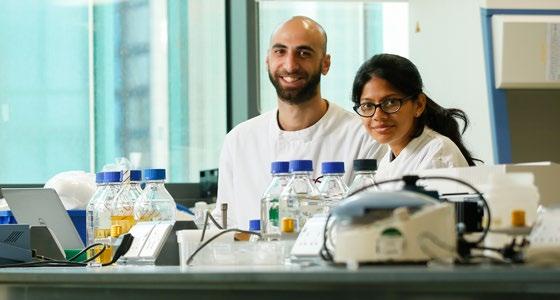
We are ranked in the top 25% nationally at 32nd, the highest position for a post-92 university, and a huge rise of 61 places compared to the previous REF in 2014, the biggest rise of any university.
Held every 6-7 years, REF is a nationwide assessment of the quality and impact of research at UK higher education institutions, based on evidence submissions that detail research outputs, real-world impact and benefits, and the institution’s research environment.
Research culture at the University is defined by a strong spirit of enquiry, innovation and enterprise, and feeds into teaching and learning to enrich our students’ experience.
We collaborate on inter-disciplinary projects not only with our colleagues, but also with international agencies, industry, the public sector, and other universities around the world. Our partnerships always have the shared aim of improving people’s lives.
From monitoring air quality to protect public health, to enhancing health in care homes and communities during the pandemic, our research has impact.
The work of an expert team of researchers from the University of Hertfordshire has been used to fundamentally improve how care homes and the NHS work together. By the end of 2020, the national Framework for Enhanced Health in Care Homes had been rolled out nationally to cover around 11,300 care homes and 410,000 care home residents.
Scan or click below to find out how our amazing research
go.herts.ac.uk/herts-research

13
makes a difference to people’s lives
Highlighting the real-world benefits to wider society, 90% of our research was classified as having ‘outstanding’ (4*) or ‘very considerable’ (3*) impact. In certain subject areas this was even higher, with Psychology obtaining a 100% 4* research impact rating.
Enterprise
The University is an institution with enterprise at its core. Within our University Enterprise Zone we have formed clusters of excellence that respond to regional and national demands, providing students and businesses with access to funding and specialist business start-up, innovation and growth support.
In our interactions with the wider community, we aim to foster and create a collaborative environment and entrepreneurial culture that is connected, inclusive, ethical, and inquisitive.
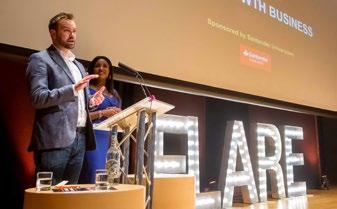
One of the ways we support start-ups is through our start-up challenge award - Flare Ignite. It offers student entrepreneurs the support, advice and training they need in areas like proposal writing, planning, finance and marketing, and the opportunity to win up to £3,500 to get their business idea off the ground and bring it to life.
Scan or click below to find out how our enterprise team can help you go.herts.ac.uk/ enterprise-zone


Kim won the 2021 Flare Ignite Social Impact award. She is a budding entrepreneur who wants to improve the lives of families with children who have special educational needs and disabilities (SEND).
“ What I learnt as a student has provided the foundations for my career and I will always be grateful for the University’s support throughout my studies. It’s because of this support that I felt confident and comfortable enough to enter the Flare Ignite competition as a graduate and challenge myself to make SENDplan a reality. ”
Scan or click below to hear more about Kim's SEND plan go.herts.ac.uk/kim
We offer expertise in apprenticeships. Apprenticeships play a crucial role in boosting the economy and are an effective way for businesses to develop a motivated, skilled, and qualified workforce, either by upskilling existing employees or recruiting new talent. The apprentice will gain a recognised qualification while earning a salary and gaining relevant industry experience.
14 Powering Potential
Global engagement
We provide international opportunities for staff and students, building a diverse community on our campus, and increasing flexible programme delivery for the overseas market.
With more than 100 international partnerships across five regions, and partnership models including franchise, dual awards, fly-in faculty, academic support, supported distance learning and recognition and articulation agreements, we are passionate about providing students around the world the opportunity to study for a University of Hertfordshire award.
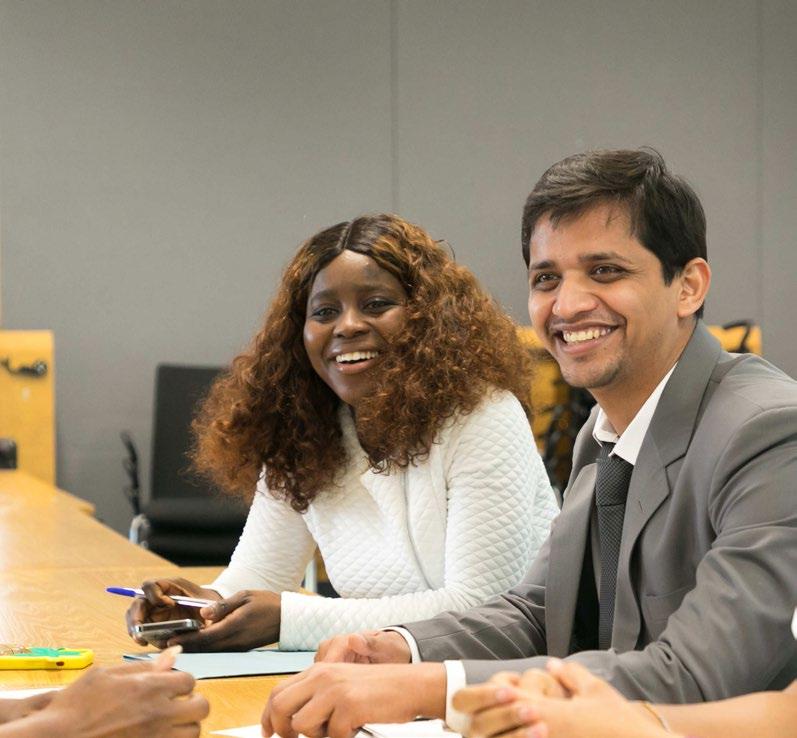
We are proud to be a participant of the QE-TNE scheme. The scheme independently measures quality across the UK’s Transnational Education sector and promotes continued evaluation, improvement, and collaboration on a global scale.
In 2019 we launched our largest scale transnational education partnership with a new institution, Global Academic Foundation in Egypt. Students can study a University degree in multiple subject areas, including Business, Computer Science, Engineering, Mass Communications, Pharmaceutical Science and Physiotherapy. Located in the centre of Egypt’s new administrative capital New Capital City, 20km east of Cairo, our campus is one of the first institutions to open in New Capital – a purpose-built capital city the size of Singapore.
Scan or click below to find out more about our international partners go.herts.ac.uk/partners

15
School of Life and Medical Sciences
Subject areas Agriculture Biological Sciences Geography, Environment and Planning
Postgraduate Medicine and Public Health Nutrition and Dietetics
Optometry Pharmacy and Pharmaceutical Science Psychology
Sport, Health and Exercise
We are a diverse School of science and everything we teach here, from town planning to optometry, is applied science - we take what we learn and use it to bring something useful to society.
We’re also a research-intensive School, with more than 300 research and postdoctoral students. Everything we teach is informed by up to date, innovative research.
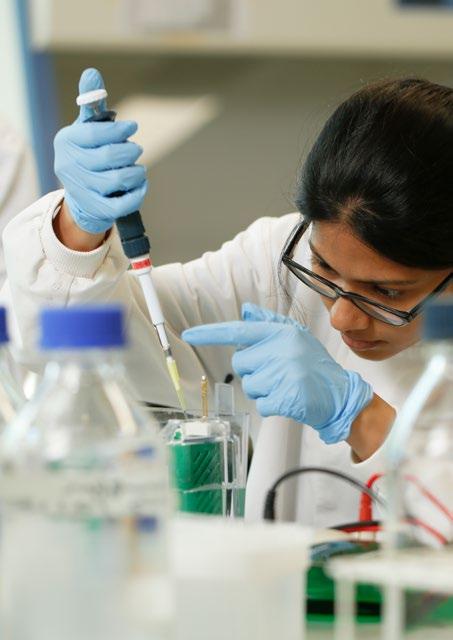
 Dr Richard Southern Dean of the School of Life and Medical Sciences
Dr Richard Southern Dean of the School of Life and Medical Sciences
16 Powering Potential
Guardian University Guide 2022
Research Excellence Framework 2021
100% overall student satisfaction for Pharmacology
National Student Survey 2022

Through our exceptional teaching and research, innovative facilities, and life changing courses, the School of Life and Medical Sciences prepares talented new scientists, health practitioners, and leaders in the field to tackle the most pressing issues facing our world today.
Our outstanding Science Building is home to spacious new laboratories and learning spaces, and offers research technologies including pharmaceutical manufacturing equipment, cell culture facilities and aseptic suites for our students and the wider community.
From our medical simulation suites, optometry specialist clinics, and sports injuries clinic to our field station used for regular field work by our geography, environment and agriculture students, our facilities enrich the curriculum and prepare our students for the future.
We are ranked 14th for Geography and Environmental Studies
Psychology ranked joint first nationally for research impact, obtaining 100% outstanding rating
17
Our experts are changing lives
From tackling climate change to helping ensure food and information security, our experts are committed to protecting people and the planet by finding innovative and sustainable solutions to the most critical social, environmental and economic challenges facing society today.
Dr Joy Myint
PhD, MA, BSc (Hons), FCOptom, Prof Cert LV, PG Cert(AP), FHEA Head of Optometry
Joy is recognised for her work in optometric education and was awarded a Fellowship by the College of Optometrists for her endeavours in this field. She is recognised both nationally and internationally for her work with Paralympic Sport Classification for Visual Impaired Athletes, both as a classifier and a researcher, including establishing a new evidencebased system of classification for shooting. She holds positions on several external panels and committees including for the General Optical Council and the College of Optometrists. Joy is an invited Liveryman of the Worshipful Company of Spectacle Makers.
Dr Victoria Hutter
MPharm, PhD, FHEA Associate Professor Research, Team Leader Pharmaceutics, Principal Lecturer Clinical Pharmaceutics

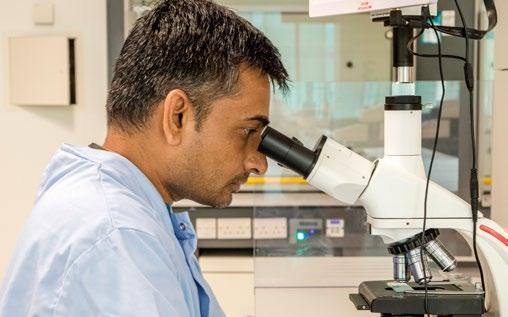

Victoria is an expert in drug delivery and in vitro toxicology, focussing on designing new animal-free tools and methodologies to assess the safety and efficacy of inhaled products. Victoria has developed patented technologies for human immunocompetent ‘organ-in-a-dish’ systems and has successfully commercialised these as co-founder and Chief Scientific Officer of ImmuONE and ACellZ. These technologies provide a human relevant system for product/medicine screening to reduce and eventually replace the requirement for animal testing. Additionally, she has raised over £7 million of research funding and currently leads a large international consortium to adapt OECD test guidelines to be free of animal products.
Scan or click on the link below to view
go.herts.ac.uk/ herts-research

18 Powering Potential
more about our research expertise
Professor John Sturzaker
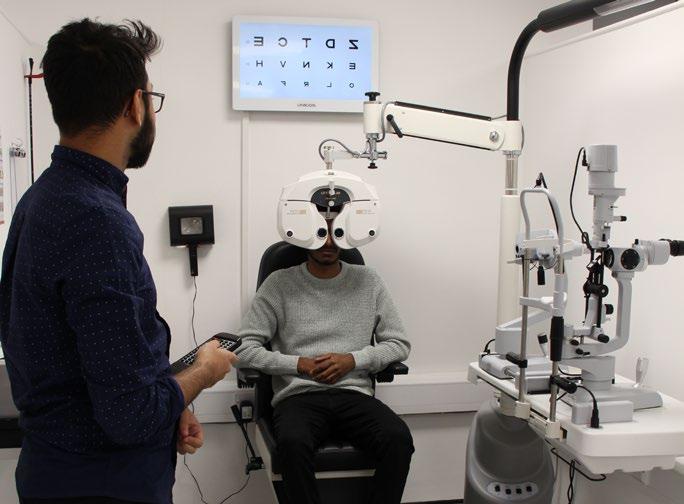
FRTPI Programme Lead for Sustainable Planning

Professor Sturzaker is the first Ebenezer Howard Professor of Planning, a post created to reflect the rich history of innovation in planning in Hertfordshire. Professor Sturzaker’s work builds on this history, focussing on the challenges of planning for, and delivering more sustainable urban growth. He works with partners in the public and private sector, exploring issues such as the translation of planning policy into outcomes on the ground, and public engagement with planning. Recently he led the Rural Planning in the 2020s project with the Royal Town Planning Institute, feeding into debates on land use and sustainability.
 Professor Katherine Brown PhD, C.Psychol, FHEA
Professor Katherine Brown PhD, C.Psychol, FHEA
Professor Brown is a fully qualified Health Psychologist registered with the Health and Care Professions Council, and specialises in the development and evaluation of public health interventions. She is an expert in the application of the theories and methods of behaviour change science, and use of digital platforms in intervention design. She has collaborated with a range of health industry partners including pharmaceuticals, technology and IT companies, third sector service providers, NHS trusts, local authorities and their partners. She is interested in enhancing existing public health and care pathways through the application of behavioural science.
19
Our inspiring alumni
Levon is currently working as the Assistant Head Coach at the Barcelona Football Academy at one of the four existing centres in the city. While in the UK, he gained as much coaching experience as he could in different sports, which enhanced his CV and landed him a job at Barcelona.

BSc Sports Studies, 2016 Assistant Head Coach, Barcelona Football Academy, Mumbai
“ Initially, I struggled to adapt as it was extremely challenging, but eventually, I found my footing, which helped me get a promotion to assistant head coach six months into the job.
My time at the University taught me a lot, which helped craft and mould my career into what it is today. Learning the intricate details about the different fields in sport helped me adapt and cope with the demands to perform at a higher level. Being an international student, I was treated very warmly and communication was swift and easy, which made the decision even easier. ”

Chika has used her business knowledge to help others. She is currently the Chief Executive Officer of Greymate Care, Africa’s pioneer AI-Powered, home care platform that connects the elderly to a vetted caregiver.
Chika Madubuko MSc Biotechnology, 2014
Founder/Chief Executive Officer, Greymate Care
“ The experience garnered over the years as a business development executive across three continents in multinational companies prepared me for this role.
Our courses were delivered using a problem-based learning approach where we tried to find solutions using real-life scenarios as case studies. ”
In June 2020, at the University’s Vice-Chancellor’s Awards, Chika was awarded our International Alumnus/Alumna of the year.
Nikunj has been working at Tesco since he was a Pre-registration Pharmacist and has worked his way up to the position he is now in today. Through the University’s resources, facilities and exceptional pharmacy degree, Nikunj had the opportunity to train three pharmacists as a preregistration tutor. This hands-on practical experience helped him when entering employment and gave him tangible skills to take into his career.

Nikunj Thakrar Pharmacy, 2009
Pharmacy Manager, Tesco and Visiting Lecturer, University of Hertfordshire
“ The University had, and still has, a massive impact on how my career has progressed. The teaching, support and resources were excellent and helped me develop into the pharmacist I am today. I count my time at university as one of the main contributing factors to my success. ”
Levon D’Souza
20 Powering Potential
Institute of Sport provides leading teaching, learning research and consultancy facilities
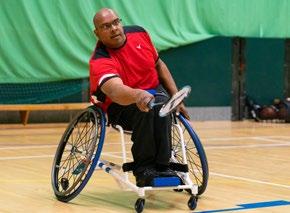
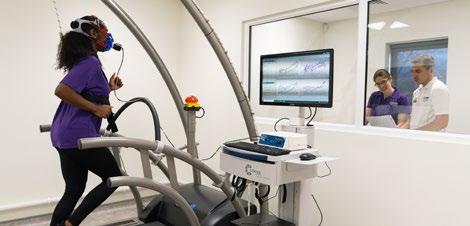
The University is committed to providing a sporting environment that nurtures exceptional talent, and we are continually improving our teaching, research and facilities in this area to increase our sporting profile, and transform lives.
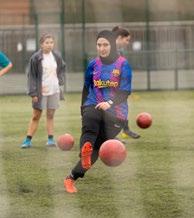
Our new £7.8 million Institute of Sport on the de Havilland Campus, provides outstanding facilities for students, staff, local communities, sport, health and exercise professionals. Just over half of the funding for the new building was provided by a Local Growth Fund investment from Hertfordshire Local Enterprise Partnership following a successful bid by the University.
The development, which is located adjacent to the Hertfordshire Sports Village, provides sport science laboratories, research space and equipment, flexible teaching and learning space, sports therapy clinics and office space. It also has facilities for existing programmes within Sport, Health and Exercise – including sport and exercise science, sports therapy and sports studies. The Institute will facilitate the delivery of a new Degree Apprenticeship in sports management.
Elizabeth’s research interests are physical activity and older adults, women and sport. She has published more than 50 research papers and books, delivered invited keynote presentations at international conferences on six continents, and written numerous commissioned monitoring and evaluation reports.
Elizabeth was recently an invited member of an international conference that produced a multi-disciplinary consensus statement on the benefits of, and barriers to, physical activity for older adults. She is currently collaborating with Watford Football Club Community Sports and Education Trust on a reminiscence project for older adults living with dementia. She is co-founder of the Anita White Foundation, which provides education and development opportunities for women leaders and scholars in sport. She is also a former president of the International Sociology of Sport Association.

Professor Elizabeth Pike
21
Professor of Sport, Health and Exercise
Research training programmes
Hertfordshire Knowledge Exchange PhD programme
The Hertfordshire Knowledge Exchange PhD programme is part of the Hertfordshire Science Partnership – a pioneering scheme that provides local and regional businesses with the opportunity to use our outstanding research facilities and access to a dedicated PhD research student. The following demonstrates the success of the exchange programme.
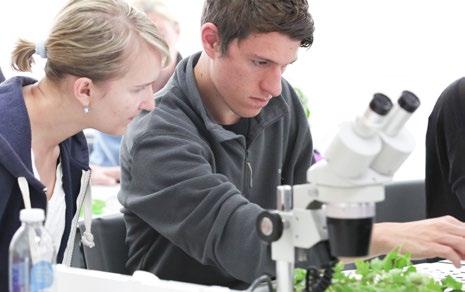
James Fortune PhD student
James is in his second year of his Hertfordshire Knowledge Exchange Partnership (HKEP) and has contributed significant research to the life sciences industry on behalf of specialist research and consultancy firm, ADAS. They specialise in the environmental, agricultural and rural sectors and James’ research to support ADAS is to investigate interactions between two fungal pathogens at different stages of their life cycles, and to develop new strategies for better control of both pathogens to reduce crop losses and improve disease modelling. The HKEP programme provides tailored support to enable businesses to carry out research and development work. James’ first year on the programme began with an initial year working in industry, where he was based at the ADAS offices in Cambridge. Here, he engaged in research consultation, managed projects and was able to immerse himself in the business.
“ When the University approached us to form the HKEP, we realised what a great opportunity it would be for the business in exposing students to our industry and the work we do at ADAS, as well as the fact that James’ project sits really well within our research interests, so we could see the value that he could bring to the work we already do. Since the project began, we’ve been able to use some of the findings from James’ project in presentations. He made a valuable contribution to other research projects whilst on placement with us and he’s developed new research methods that we can use within the business. ”
Faye Ritchie Plant Pathologist, ADAS
22 Powering Potential
EPSRC Centre for Doctoral Training in Aerosol Science
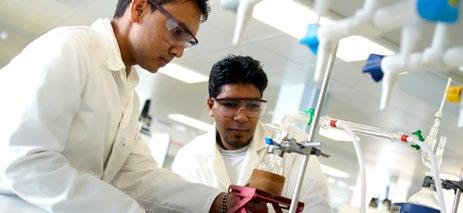
The University of Hertfordshire is a founder member of the EPSRC Centre, led by the University of Bristol, with the Universities of Bath, Cambridge, Imperial College, Leeds and Manchester. It is also the only centre for doctoral training in the engineering and physical sciences of aerosols in the UK. The centre has addressed the disconnect between typical training paradigms and contemporary research and engineering challenges, and offers a different approach to training the next generation of aerosol scientists. Many CDT scientists contributed to the UK's research efforts during the Covid-19 pandemic.
Altin is a PhD student investigating Invitro modelling of the lung’s response to environmental nanoparticulates. This will involve developing a standalone in vitro model that bridges the gap between traditional in vitro toxicology and in vivo toxicology, with the desire of reducing the need of animal models for nanoparticles toxicology and drug development.


As a result of high content cell imaging and analysis, Altin has obtained interesting morphometric data from lung epithelial cell lines exposed to nanoparticle and has developed automated analysis programmes using Python. He is excited and enthusiastic about the results of this analysis, and the progression of his research.
Toria’s PhD focuses on aerosol drug delivery to the lungs.
She is part of the first cohort of the CDT in Aerosol Science and her doctoral research investigates how the chemical and physical properties of aerosol medicines affect their interaction with water vapour and their subsequent deposition in the pulmonary system. The CDT programme has been an invaluable experience for her, with the initial training year setting her up for her PhD research by instilling her with the knowledge of fundamental aerosol properties, processes and measurement techniques. Furthermore, the CDT has provided her with access to webinars from a variety of subject experts and key support in her studies from colleagues in her cohort, academics associated with the course, and her industry partner.
Toria’s recent research has involved developing a computational model to account for the hygroscopic growth of pressurised metered dose inhaler droplets following inhalation, and to predict their regional and total deposition in the respiratory system. However, she is currently developing a microcrystalliser system capable of producing monodisperse drug particles, to further explore how drug particle properties influence their interaction with water vapour upon entering the pulmonary system.
23
Altin Kocinaj EPSRC CDT student
Victoria Legh-Land
Research
Smart mobility addresses the challenges of climate change

There is a growing need to find a solution to the climate emergency. The Smart Mobility Unit’s work is focused on developing applied research solutions collaboratively with industry and government in order to help address these issues from the perspective of public and personal transport. Current work includes local governance models, long term funding mechanisms, implementing multimodal through-ticketing, shared electric vehicle infrastructure and demand responsive transport solutions. Enabling people to move around efficiently using a variety of zero carbon solutions to create sustainable communities is an overarching aim of the Unit. This work is being developed using experimental projects across regions and in smaller scale demonstrator projects. These aim to share good practice as well as working collaboratively to inform learning.
What can a worm tell us about a human disease?
Dr Maria Dimitriadi, a Wellcome Trust funded Principal Investigator in the School of Life and Medical Science, is using a roundworm that shares many biological characteristics with humans to mimic Spinal Muscular Atrophy (SMA), an incurable condition. Dr Dimitriadi’s work will spark future research into developing effective therapies for SMA patients.
Urbanism research
The University’s Tarmac Sustainable Living Partnership has produced significant research on aspects of sustainable construction and placemaking. The University’s Memorandum of Understanding with Letchworth Garden City Heritage Foundation has enabled a wide range of partnership working in learning and research areas between the University and the world’s first garden city. These include the International Garden Cities Institute.
Through our planning, urbanism and transport staff, we have also developed an exciting partnership with the Laboratory for Building Cultures in France, at the École nationale supérieure d’architecture de Grenoble through which increasing collaborations in teaching and research are underway.
24 Powering Potential
Future research
At the School of Life and Medical Sciences we are committed to finding solutions to social, economic, and environmental problems. Through this commitment we continue to discover and formulate new medicines by forging stronger alliances between clinical and primary science researchers, and expand our portfolio to other areas of growth within our already successful areas such as Optometry.
Opportunities for staff development are encouraged by the University. A small group of staff from a clinical background have stepped away from the clinic to become academics because of their interest in teaching. Two members of staff are studying PhDs in Education – Academic Behavioural Confidence in Students on Clinical Programmes, and Learning Science with Understanding. Publications from these studies will add to the educational work taking place in the department. We will also have the opportunity to accept more research students, including members of staff in the field of science/clinical education.
Future aspirations
The University is contributing more than ever to future economic growth and to positive changes in the way we all live, work and learn. Our biosciences team are focused on supporting businesses to solve scientific problems in many specialist areas – infectious diseases, inherited genetic diseases, cancer, food spoilage and crop protection/sustainability, and bioinformatics. The diversity of services include consultancy, collaborative PhD studies, collaborative grant applications, and bespoke training for businesses and healthcare providers in key scientific technologies.
Through the Urbanism, and the Smart Mobility Unit, our School supports businesses and social enterprises through direct consultancy projects, such as memorandums of understanding, knowledge exchange partnerships, roundtables, applied research projects, research partnerships such as the Sustainable Living Partnership, and outposted academic directorships such as at the International Garden Cities Institute.
The expansion of short courses include the Aseptic Manufacturing course and the Health Simulation training, which provides the practical training needs of industry in the UK and overseas.
25
We continue to discover and formulate new medicines by forging stronger alliances between clinical and primary science researchers
HS1297SLMS/DS/0422 University of Hertfordshire Hatfield, UK AL10 9AB +44 (0)1707 284000 herts.ac.uk /uniofherts @UniofHerts @UniofHerts



























 Dr Richard Southern Dean of the School of Life and Medical Sciences
Dr Richard Southern Dean of the School of Life and Medical Sciences






 Professor Katherine Brown PhD, C.Psychol, FHEA
Professor Katherine Brown PhD, C.Psychol, FHEA












